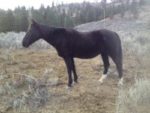Beating Winter Weight Loss
Alexa Linton, Equine Sport Therapist, BSc. KIn
Where does the time go? Summer is quickly fading, autumn is upon us, and it’s not long before we embark upon another winter season. As horse owners, this changing of seasons has special significance.
Not only does it signal the return to blankets, rainy rides and thrush, but many of us are already thinking about how we can keep the weight on our hard-keepers this winter season.
The summer months on the island are generally good to our horses, with hay aplenty, lush grass, and sunny days that seem to stretch into infinity. Usually it is all we can do to keep the weight off our horses during the summer months.
Winter, however, brings cold weather, and although horses are naturally able to tolerate very low temperatures, it is important for you, as the horse owner to be prepared for increased energy use and stress levels, often leading to weight loss.
An effective and adequate feeding program, parasite control, shelter and water are among the basic preparations for any horse owner.
One easy way to prepare is to slowly increase your horse’s calorie intake when coming into the winter season, thereby creating a small “protective” fat layer, which can provide insulation and provide additional energy during times of stress. Altering your feeding program by adding extra calories can be very helpful as we enter the cooler months.
Some of my favourite additions are feeds high in essential fatty acids (EFAs), “good” fats which also promote the health of the digestive tract, nervous system, and brain. EFAs, otherwise known as Omega 3,6, and 9, not only promote healthy weight gain (or loss) if necessary, but also improve the health of the body at a cellular level.
It is important to realize that horses are not designed to work with large amounts of fats, EFAs or not. Working with feeds that contain EFAs within a fibrous base, aids the equine digestive tract to absorb fats properly. These include fresh-ground flax or even black-oil sunflower seeds. Make sure any additional or new feeds are introduced very slowly, over a period of up to two weeks. This allows the sensitive equine digestive tract to adjust.
If your horse has trouble gaining weight throughout the year, it may be time to consult a professional about the effectiveness of their digestive tract. This inability to gain weight can often suggest a problem with absorption of nutrients and sometimes cannot be remedied by an increase in calories. In fact, increasing the caloric intake, can in some cases, cause further damage.
However, once a problem is identified, it is easy to improve the function of the digestive tract through natural supplementation, feed change, acupressure, or veterinary intervention.
Consulting a professional is an easy way to prevent problems in the future. Many horse owners think that their horse requires a winter blanket. In fact, horses have a built-in rain, snow, and sleet repellent. The oils in your horse’s long winter coat were created to stand up to the worst winter blahs, and provide an insulating layer that often beats the best blanket. A long winter coat is designed to fluff up, trapping a layer of air within the coat. A blanket depresses the hair coat, causing a loss of insulation.
If you decide to blanket your hard-keeper make sure the blanket is waterproof and warm.
If not:
-Allow their hair coat to grow out long and shaggy including the ears and fetlocks.
-Also, make sure that a shelter is available if necessary.
A good way to tell if your horse is warm enough is by checking his or her ears. If they are cold, it is a good bet that your horse is cold. If your horse is shivering, than her or she is definitely cold, as shivering helps them to increase their body temperature to a manageable level.
Make sure to check your horse’s condition at least once per month over the autumn and winter months.
As it is often difficult to evaluate by merely looking at your horse during their shaggier months, make sure to use your hands to check. Palpate the ribs, making sure that you cannot see the ribs but can feel them with slight pressure over the rib area. Check the neck, croup, withers, and tailhead, comparing this to the previous month’s condition.
Be prepared and you’ll find it a much easier task to keep your horse in great condition through the winter months. Be sure that caloric intake is adequate, digestive tract is working effectively, parasites are eliminated, shelter, water, and warmth are readily available, and your horse will be happy, healthy, and in great condition by the spring.


